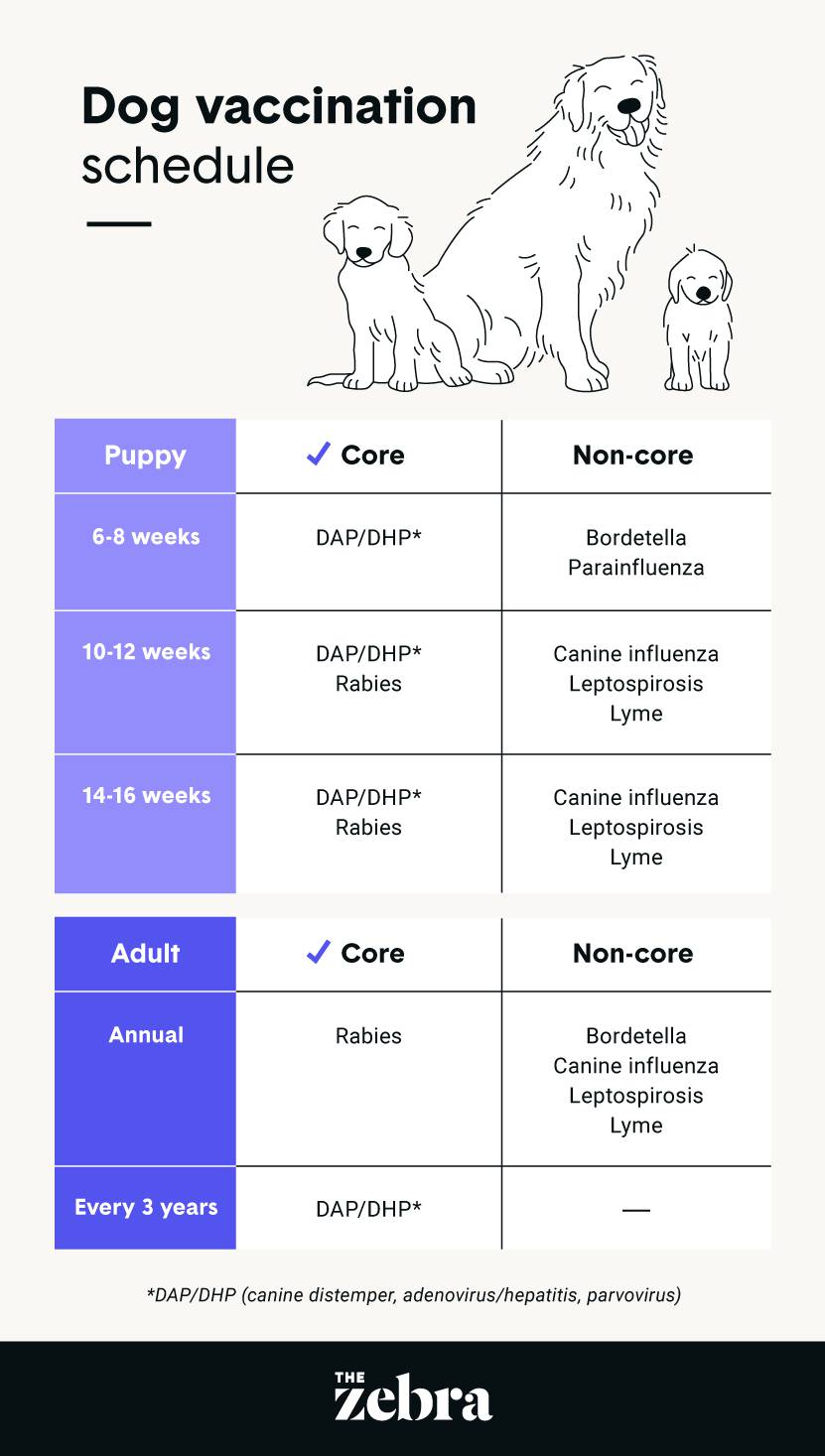The puppy vaccine schedule consists of at least three rounds of vaccines before a puppy can go outside into public areas. Puppies are considered fully vaccinated after their third round of vaccines.
This ensures their protection against diseases such as canine distemper and canine hepatitis. It is important to adhere to a proper vaccination schedule to ensure the health and well-being of your puppy. Additionally, different sources such as the American Kennel Club and the RSPCA provide comprehensive guides on puppy vaccinations and when they should be administered.
By following these guidelines, you can help protect your puppy from potentially life-threatening illnesses.

Credit: www.thezebra.com
Understanding Puppy Vaccinations
Discover everything you need to know about puppy vaccinations, including the recommended vaccine schedule. Ensure your furry friend stays protected and healthy with the right shots at the right time.
Vaccinations play a crucial role in keeping your furry friend healthy and protected throughout their life. As a responsible pet owner, it is essential to understand the importance of puppy vaccinations and ensure that your new bundle of joy receives the necessary shots at the right time. In this section, we will discuss the importance of vaccinations and the common vaccines recommended for puppies.
Importance Of Vaccinations
Vaccinations are essential for puppies as they help prevent the onset of various life-threatening diseases. By introducing small amounts of modified viruses or bacteria into the puppy’s body, vaccines train their immune system to recognize and fight off these harmful pathogens. Some of the key reasons why puppy vaccinations are crucial include:
- Preventing deadly diseases: Vaccinations protect puppies from diseases like distemper, parvovirus, hepatitis, and rabies, which can be fatal if left untreated.
- Building immunity: By stimulating the immune system, vaccines help puppies develop natural defenses against specific diseases.
- Protecting the community: Vaccinated puppies are less likely to spread contagious diseases to other dogs or even humans, ensuring the overall well-being of the community.
Common Vaccines For Puppies
There are several vaccines recommended for puppies, each targeting specific diseases. The most common vaccines included in a puppy’s vaccination schedule are:
| Vaccine | Description |
|---|---|
| DHPP (Distemper, Hepatitis, Parainfluenza, Parvovirus) | This combination vaccine protects against four common and highly contagious diseases that can be severe, especially in young puppies. |
| Rabies | The rabies vaccine is crucial to protect puppies from this deadly viral disease, which can be transmitted to humans through infected animals. |
It’s important to note that the specific vaccination schedule for puppies may vary based on factors such as geographical location, lifestyle, and individual health considerations. To ensure your puppy receives the appropriate vaccines, consult with a veterinarian who can tailor a vaccination plan specifically for your furry friend.
Remember, timely vaccinations are key to providing your puppy with a healthy and happy life, so stay informed and prioritize their well-being.
:strip_icc()/what-to-know-about-puppy-vaccinations-2804982_V3-f8ec25da2f8442df88d90e34be21b993.jpg)
Credit: www.thesprucepets.com
Puppy Vaccine Schedule
When bringing home a new puppy, it’s important to prioritize their health and well-being. One crucial aspect of puppy care is ensuring they receive the necessary vaccinations to protect them from various diseases and illnesses. Understanding the puppy vaccine schedule is essential for every responsible pet owner. Let’s dive into the key factors to consider when it comes to the puppy vaccine schedule.
When To Start Vaccinations
The timing of the first vaccination for your puppy is crucial in building their immunity against diseases. In general, puppies should start receiving vaccinations around 6 to 8 weeks of age. This is because they may still carry some antibodies from their mother, which can interfere with the effectiveness of the vaccines. By starting vaccinations at around 6 to 8 weeks, you can ensure that your puppy’s immune system is ready to respond to the vaccines and develop its own protection.
Number Of Shots Needed
A proper puppy vaccine schedule typically includes multiple shots to ensure thorough protection. Most puppies will require a series of three to four vaccinations, given at 3 to 4-week intervals. The exact number of shots depends on various factors, including the type of vaccine and the specific diseases it protects against. It’s essential to consult with your veterinarian to determine the right number of shots for your puppy based on their particular needs.
Time Between Shots
The time between shots plays a crucial role in building your puppy’s immunity effectively. Giving vaccinations too closely together may not allow enough time for the immune system to produce a strong response. On the other hand, prolonging the time between shots may leave your puppy vulnerable to diseases. Typically, vaccinations are administered every 3 to 4 weeks to ensure optimal protection. Maintaining consistency with the vaccine schedule is key to providing your puppy with long-lasting immunity.
Core Vaccines For Puppies
Ensuring that your puppy receives the proper vaccines is crucial to their health and well-being. Vaccinations protect your furry friend from various diseases and help prevent the spread of contagious illnesses. The core vaccines are considered essential for all puppies and provide protection against some of the most common and dangerous canine diseases. Let’s take a closer look at the three core vaccines for puppies: Canine Distemper, Canine Hepatitis, and Canine Parvovirus.
Canine Distemper
Canine Distemper is a highly contagious viral disease that affects a puppy’s respiratory, gastrointestinal, and central nervous systems. It can be transmitted through direct contact with an infected dog or through exposure to contaminated surfaces. Distemper can lead to severe illness, including respiratory problems, fever, paralysis, and even death. Vaccinating your puppy against Canine Distemper is essential in ensuring their protection.
Canine Hepatitis
Canine Hepatitis is another contagious viral disease that affects a puppy’s liver, kidneys, and other organs. It is primarily transmitted through direct contact with infected urine, feces, blood, or saliva. Hepatitis can cause a range of symptoms, such as lethargy, fever, vomiting, and in severe cases, liver failure. Vaccinating your puppy against Canine Hepatitis is crucial in preventing this potentially life-threatening disease.
Canine Parvovirus
Canine Parvovirus, commonly known as Parvo, is a highly contagious disease that affects a puppy’s gastrointestinal system. It is transmitted through direct contact with an infected dog’s feces or vomit. Parvo can cause severe vomiting, diarrhea, dehydration, and can be fatal, especially in young puppies. Vaccinating your puppy against Canine Parvovirus is crucial to protect them from this highly contagious and dangerous disease.
Remember, following a proper puppy vaccine schedule recommended by your veterinarian is key to ensuring your puppy’s health and well-being. Vaccinations typically start at around 6-8 weeks of age, with booster shots given periodically to maintain immunity throughout their life. Consult with your veterinarian to determine the best vaccine schedule for your puppy.
Noncore Vaccines For Puppies
Ensure your puppy’s health with a comprehensive vaccine schedule. From core to noncore vaccines, our guide provides all the essential information you need to keep your furry friend protected. Discover the recommended shots for your puppy’s first year and ensure their well-being.
When it comes to keeping your puppy healthy and protected against infectious diseases, it’s important to follow a proper vaccine schedule. While core vaccines are essential and protect against highly contagious and potentially deadly diseases, there are also noncore vaccines that may be recommended based on your puppy’s lifestyle and environment.
Leptospirosis
Leptospirosis is a bacterial infection that can impact both dogs and humans. It is spread through contact with contaminated water, soil, or urine of infected animals. This disease can cause severe kidney and liver damage, and in some cases, be fatal. If your puppy spends a lot of time outdoors, especially in rural or wooded areas, a leptospirosis vaccine may be recommended. The vaccine is typically given annually to maintain protection.
Bordetella
Bordetella, also known as kennel cough, is a highly contagious respiratory infection commonly spread in places like pet boarding facilities, grooming salons, and dog parks. Symptoms include coughing, sneezing, and nasal discharge. While most cases are mild, in some instances, it can progress to pneumonia. If your puppy is frequently exposed to other dogs, such as at daycare or during training classes, a bordetella vaccine may be recommended. It is usually given annually or every six months, depending on your puppy’s risk of exposure.
Lyme Disease
Lyme disease is caused by a bacterium transmitted through the bite of infected ticks. It can affect both dogs and humans and can lead to joint pain, lameness, and in severe cases, kidney damage. If you live in an area where ticks are prevalent or if you frequently take your puppy hiking or camping, a Lyme disease vaccine may be recommended. The vaccine is typically given annually or semi-annually, depending on the risk of tick exposure in your area.
Remember, it’s essential to consult with your veterinarian to determine which noncore vaccines are suitable for your puppy based on their individual needs and lifestyle. By staying up to date with vaccinations, you can help protect your furry friend from preventable diseases and ensure they live a long, healthy, and active life.
Important Considerations For Puppy Vaccinations
Ensure the health and well-being of your new furry friend by following a proper puppy vaccine schedule. With at least three rounds of shots, your puppy will be fully vaccinated and ready to explore public areas safely. Avoid any potential health risks by staying informed and up-to-date on your puppy’s vaccinations.
Vaccine Reactions
One of the important considerations for puppy vaccinations is the possibility of vaccine reactions. While vaccines are necessary to protect your puppy from potentially deadly diseases, it’s important to be aware that some puppies may experience adverse reactions after receiving their shots. These reactions can range from mild symptoms like soreness and lethargy to more severe allergic reactions. It’s vital to closely monitor your puppy after each vaccination and contact your veterinarian if you notice any unusual symptoms.
Vaccine Records And Documentation
Another crucial aspect of puppy vaccinations is keeping track of vaccine records and documentation. Your puppy’s vaccination records play a vital role in ensuring their overall health and well-being. It helps you keep track of the vaccines your puppy has received and when they are due for their next shots. These records are not only essential for your puppy’s medical history but are often required by boarding facilities, groomers, and training classes. By maintaining accurate and up-to-date vaccine records, you can ensure that your puppy receives the necessary vaccinations on time.
:max_bytes(150000):strip_icc()/puppy-vaccination-schedule-update-2022-a5aa7a089b69433aa597f18de86957ba.png)
Credit: www.dailypaws.com
Frequently Asked Questions For Puppy Vaccine Schedule And Information
What Is The Proper Vaccination Schedule For A Puppy?
Puppies need at least three rounds of vaccinations before going outside. They are considered fully vaccinated after the third round.
How Many Rounds Of Shots Do Puppies Need Before Going Outside?
Puppies need at least three rounds of shots before going outside. This ensures they are fully vaccinated.
How Many Shots Do Puppies Need?
Puppies need at least three rounds of shots before going outside into public areas.
How Long Do You Have To Wait Between Shots For A Puppy?
Puppies are fully vaccinated after their third round of shots. They should have at least three rounds of vaccines before going outside.
Conclusion
As responsible pet owners, it is crucial to adhere to a proper puppy vaccine schedule. By ensuring our furry friends receive the necessary vaccinations, we help protect them against serious diseases and keep them healthy. Remember, puppies need multiple rounds of vaccines before going outside into public areas.
Stay informed about the recommended vaccination schedule and consult with your veterinarian for personalized advice. Investing in your puppy’s health today will contribute to a happy and vibrant future together.
